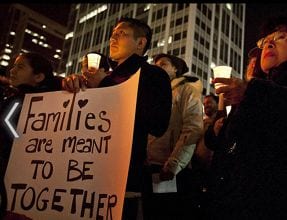United States v. Philip Swaby, 4th Circuit Court of Appeals (filed 4/24/17): Court’s “general” immigration warnings did not cure lawyer’s erroneous advice regarding consequences of guilty plea.
A very important case for lawyers representing defendants facing possible deportation as a consequence of criminal convictions. The facts here are very similar to those SCOTUS addressed in Padilla v. Kentucky, 559 U.S. 356 (2010). Counsel was appointed to represent a client who had lawful permanent resident status. He was married to a citizen and has two daughters who are citizens. He also has a step-daughter. He and his wife were indicted for trafficking counterfeit goods. Recognizing possible immigration consequences, counsel reached out to another attorney, one who specialized in immigration law. Counsel sent the indictment and what he believed was the applicable statute to the immigration lawyer. Unfortunately, he inadvertently sent the wrong statute so the immigration lawyer erroneously advised plea counsel that a plea to the crime would not be considered an aggravated felony for immigration purposes under 8 U.S.C. 1101(a)(43)(M)(i). The plea agreement ultimately entered into by Petitioner and the Government was predicated on their understandings that Swaby would be free from deportation if he secured a sentence for less than 365 days. The plea agreement itself contained boilerplate warnings about possible immigration consequences. And, at the plea itself, the district court judge informed Petitioner that his guilty plea could lead to his deportation or removal from the United States.
The short of it is that the Fourth Circuit found that the general warnings by the district court judge did not mitigate the prejudice of plea counsel’s deficient performance. In United States v. Akinsade, 686 F.3d 248 (4th Cir. 2012), the Court also found that a district court’s general warnings of risk of deportation do not correct counsel’s deficient performance, although a “careful explanation” specifically correcting misadvice may cure any prejudice that misadvice may cause. Id. at 253-54.
As to the prejudice prong of the Strickland inquiry, the Court notes that a defendant is prejudiced if “there is a reasonable probability that, but for counsel’s errors, [a defendant] would not have pleaded guilty and would have insisted on going to trial. Hill v. Lockhart, 474 U.S. 52 (1985). In the context of a guilty plea, the Fourth Circuit recognizes that a defendant is prejudiced if there is a reasonable probability that the defendant would have negotiated a plea agreement that did not affect his immigration status. United States v. Rodriguez-Vega, 797 F.3d 781, 788-89 (9th Cir. 2015); Kovacs v. United States, 744 F.3d 44, 52-53 (2d Cir. 2014). Under these tests, and assessing Petitioner’s situation, the Court found that Petitioner demonstrated a reasonable likelihood that he would have negotiated for, and the government would have been amenable to, a plea agreement that had no immigration consequences. Alternatively, Petitioner could have shown prejudice by showing a reasonable likelihood that, absent his counsel’s error, he would have gone to trial instead. The Court reversed, vacated, and remanded Petitioner’s case for further proceedings consistent with this opinion. It looks like Petitioner is going to be able to stay in the United States with his wife and children, a very humane result under the facts of this case. Chief Judge Gregory, Judge Wynn and Judge Thacker on the opinion.

